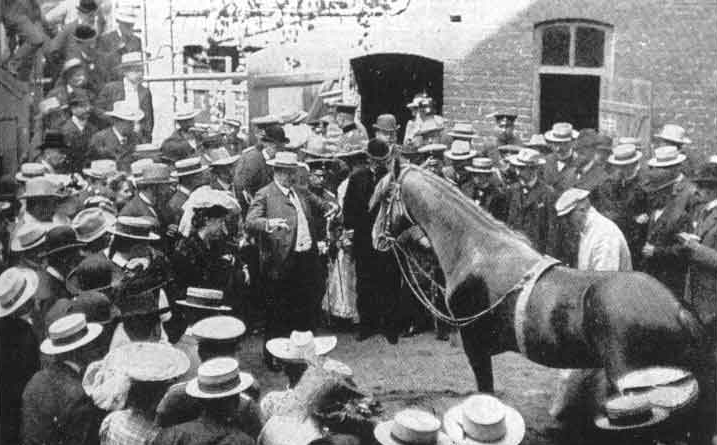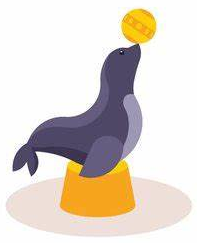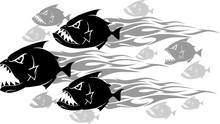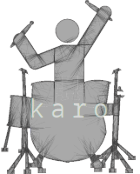clever hans
first things first, a riddle . . .
I write songs but I am not a songwriter.
What am I?
It has been an entirely unexpected gift.
If you don't recognize the reference, Clever Hans was a performing horse in early 2oth century Germany who it was thought could do math. Not rocket science math mind you. Although Hans was clever enough to speak a foreign language, he only did basic math. Asked the question, Was ist zwei plus zwei? (German for 'what is 2 + 2'), the stallion would tap a front hoof four times. Asked the German for 'what is the number after 5', Hans would tap his hoof six times.

Of course, a horse can do math the same way pigs can perambulate on two legs, never mind acquire porcine wingage. But Hans was clever enough to recognize unconscious movements of his trainer's body that indicated when to stop tapping his hoof. It wasn't a fraud. It was just the trainer and audience misintepreted what the horse thought was his favourite game of tap your hoof until I signal to stop, and then I give you sugar.
Investigation found that, once started by the horse's trainer who seemed to believe it, the conclusion the horse could do math biased audiences to the same conclusion, and so on. That error is now known as the 'Clever Hans effect' (rather than the more trenchant but less PC 'Dumb Observer effect').
Maybe I'm stretching the metaphor but that's how I have been 'taught' to sing.
Yeah... I am stretching the metaphor. But I have poetic license.
I sing but I have no more understanding of music or singing than Hans had for the music of numbers. It only appears that I do because my vocal mechanisms have been trained to mimic singing as though I know what I am doing. Like early ABBA singing in phonetic English.
I don't put myself down saying this. It's just my reality. Without the songs, without the songs training my voice, I would have no music. Like karosong #36 says:
there were brick walls betweeen me and music
and no matter how high i jumped or far i ran
there was no way over. no way 'round
no way through to music
— from Brick walls, a 3.2 karosong with Nine by Yanni
singing lessons 1.0/2.0
the lessons start
Every song has taught me precisely how every syllable of lyric, every vocal nuance was to be sung, and drilled that into me with repetition.
And then more repetition. And then even more. Hundreds of takes for every single song in the 2.0 phase. (And those were songs I already knew all the lyrics to.)
Even now, a song is not finished channeling — months after all the lyrics have come through — until I can sing that song exactly as taught, until I have "mastered" it. Meaning I can sing it well enough that any given take — barring the usual range of bodily noises, coughs, and senior channel moments etc — could be a keeper good enough to be a demo of the song.
How exact? How precise? Judge for yourself.

Sequential vocal takes Just could never feel 2.3 (with In Your Eyes by Yanni).
The red line in the screen capture above is the audio playhead, traveling from the left to the right across the waveforms from three successive takes.
The vertically aligned waveforms show the three takes are in near-perfect sync, except for a stumble in the top track to the right of the playhead (which takes a few phrases to get back on track).
However, notice the small variation in the waveform shape between takes, reflecting small differences in my singing each day.
Of course, a real singer would be able to achieve, well easily surpass that feat with, well charitably, just three takes. But s/he would know what s/he was doing. I still don't. Even after all these years singing, all these songs. I do not consciously understand what I do when I sing.
But, unlike Hans who didn't know he was counting, I know that I am singing. Clever eh?

Arrf arrf
not only trained, but shaped.
The song energies have shaped and refined my vocal mechanisms like the apocryphal Inuit carver. In that tradition, the carver is said to expose the carving already in the material — an arff arrfing seal for instance — by simply removing the 'not arff arrfing seal' bits.
In the case of my singing, the process of having those 'not carving' bits removed from my vocal mechanisms started in the first song phase, but only really got going in the second phase, began to flower in the third phase and fruited at the end of the 3.2 song set.
Poetic license, remember?
What that meant was that each and every eensy weensy teensy twitching, shaking, vibrating, resonating bit of my vocal apparatus was — one by one, and with infinite patience across many years — retaught, retrained, and reshaped to deliver these songs, to be the voice of karo.
While the singing lessons did start in the first phase, it was only a small focus. Could only be a small focus. Frankly, I played guitar even worse than I sang. Trying to channel three different things — lyrics, guitar and singing — under intense energy and emotional bombardment, was just too overwhelming. The quality of my singing got little emphasis.
Other than to rejoice that it was happening. Or rue the day. Depending on my mood.
That changed with Awakening, the first 3.0 asynchronous collaboration. (Which naturally channeled at the start of the 2.0 period but before the 1.0 stubs. The karo energies often exhibit an odd relationship to linear time.) Now the music was known, so I could focus on just two things. Singing and the new lyrics.
Good thing. Awakening was a brutally difficult vocal to master. For me. Not for a real singer. It had vocal stops and drops and jump ups and elongations that challenged my ability to get sound past my lips, never-mind sound musical. It took several months of struggle with my voice just to 'get' the whole vocal before I could even think about mastering it. Which took more months of singing it over and over.
Multi-tracking
An early karosongs style came out of that struggle. To keep me on track, I found it helpful to have previous vocal takes playing back softly in my headphones as I recorded. Out of that came mixing with multiple takes (multiple gordons in other words), a style that was used for Awakening and most of the 2.0 songs.
This recording was Awakening's first 'release' — the first mix I shared with an audience. It was a 'limited' distribution, to just a few friends and family members, with lots of caveats and be awares and hope you like its. You can hear the three tracks are sometimes slightly out of sync. Meaning I hadn't mastered it yet. But you can hear the tracks coming together more and more the same.
The 2.0 songs had an even bigger advantage. Now both lyrics and music were known. Singing became the primary focus.
Each new song stretched my vocal range. Each new song added to my technique. And each new song contributed to the slow process reshaping my physical voice.
You could visualize it as each song being a tiny medi-robot nipping and tucking at my vocal apparatus, the tiny song-medi-robots swarming like piranha, then darting off, leaving the shining bones of a reshaped vocal tract.

It would be fun to visualize it that way. Nowhere near as tedious as it was to make a tiny adjustment of some tiny piece of my throat today, then make almost the same change on the next-door piece tomorrow, knowing the next next-door piece is already waiting its turn.
No. I'm not bitter.
Actually I'm not. Bitter. I've long accepted my nature, the price of my nature. So, whatever the reason, whatever the function in energy that I am serving, to be given this music, these songs is a wondrous gift.
To sing this music is joy.
Hell. Just to sing is a joy. A joy I'd given up on long ago. Never thought I'd have. Apart from the odd half-mumbling of the national anthem or Happy Birthday, there were few times I sang anything. Christmas carols door to door with my brothers as a young boy to earn money for sweets and presents. A year of rugby raunch at the start of university, where copious draft beer ensured the question of singing competence did not arise.
One exception was with my daughters when they were very young and we were living in Australia.
To finish putting the girls to bed, I would sing un Candian errant, a classic Qubecois lament about a young Francophone exiled after the 1837 Rebellion in Lower Canada (now Quebec).
Banished and alone, the exile wanders through endless "alien lands unknown," always thinking of his lost country, and imploring anyone who travels there to tell his friends que je me souviens d'eux — 'that I remember them'.
(By the way, for those of you who've tried to cross the street in Montreal, that's the origin story for the "je me souviens" on the Quebec car license plate that nearly killed you.)
I liked singing the song because the girls didn't care how well I sang, and it was in French anyways, so they didn't really know any better. It also reminded me of Canada at a time that I felt trapped in Australia. It could make me cry, foreshadowing the way karosongs lock into me through my emotions.
I have experienced that emotional lock-in on first hearing a number of popular radio songs. Janis Ian's At 17 left me in tears. Same for Cat's in the Cradle by Harry Chapin. The Living Years by Mike and the Mechanics.
All these are songs that for some reason . . . in the singing? . . . I was able to pickout and track the semantic meaning of the lyrics. That does not happen often. Mostly with singer-songwriters. With a few groups. But most of the time the vocal is just another musical instrument to my hearing.
And they shared a commonality with many later karosongs. They were first person, lyrically direct, intense, and emotionally revelatory. And they all triggered deep upwellings in my own emotions.
However. one of the most intense lock-ins came from a song in the third person, Harry Chapin's Mr Tanner. You can find it on youtube if you haven't heard it before. It's a sad, even tragic song about an ordinary man, just a cleaner, a talented baritone who was happy to sing in local shows and in the back of his shop. But he was encouraged to overreach with a concert in the big city and failed. Of course.
It was the chorus that punched me in the gut.
But music was his life, it was not his livelihood,
And it made him feel so happy and it made him feel so good.
And he sang from his heart and he sang from his soul.
He did not know how well he sang; it just made him whole.
— from Mr Tanner by Harry Chapin
That was me. I understood the feelings expressed. I felt the feelings. Except I was an idiot musant and could not sing like Mr Tanner. A deep sadness overwhelmed me. The experience was so powerful, it was eventually included in the 4th karosong.
but somehow through all those years
this little voice still rang inside
when chapin sang mr tanner
it would cry
— from Just could never feel, 1.0/2.0 karosong
lessons 3.x
the lessons continue
My, that was certainly an interesting side trip into the emotional underpinnings of the songs in the first two phases. Little changed in the third phase as those emotional ties remained key drivers. If anything, their range increased. In the earlier phases, they had mostly dealt with emotional shit from the past. But in the 3.1 set, they began to deal with emotional shit in the present (The rain must fall) and emotional shit in the future (For my new lover).
But coming back to the singing lessons — the training became even more precise, ever more insistent in the third phase. While each new song came with its own specific lessons, the overall instructional design was about strengthening my voice, learning to hold notes longer or deliver them faster, and bringing the delivery of my vocals into better alignment with the lead instrument of the async track.
That last was key. During the 3.1 set I began to understand how my vocals work with their asynchronous tracks (at least how I think they work, always remembering the caveat that I'm an idiot musant).
Unlike a 'standard' vocal which takes over the musical lead while the instruments move into the background and support the vocal, karosong vocals have to coexist and work with a dominant lead instrument. That's just the nature of working with instrumental tracks as async partners.
My first understanding of how I dealt with that difference was that I 'hooked' unto the lead instrument and let it pull my singing through the song, like a water skier behind a boat.
Which made a lot of sense to me, and helped me work out why I had so much difficulty with certain songs in the 3.1 set.
Lead instruments like Yanni's piano or Jesse's guitar tend to be distinct and easy for me to follow. But when the lead instrument is a bit imprecise like a swirling synthesizer on top of strings, or is swamped by say a building crescendo, I have great difficulty finding, never mind following, the lead instrument with my vocals.
The two songs in the 3.1 set that took the longest to channel were of these difficult for me to understand types. For instance, while I got all four choruses for Got to get back quickly, its two verses took several months because I kept getting lost in the building crescendo of Yanni's To The One Who Knows.
Along the old Silk Road (with Silk Road by Kitaro) took even longer, 2 years in all. But the first year was just me listening to the song over and over, unable to figure out how many verses there were, or if there even was a chorus. And I couldn't find an instrument to latch unto because everything was flowing synths and strings, and the lead instrument kept changing. The song was just a wall of impenetrable sound to me for months.
But once I'd finally! 'got' the song, I figured out how to latch unto the melody line and follow that rather than the instrument.
(No doubt a skill a real musician would take for granted.)
My understanding of my vocals changed again during the 3.2 set, when I saw that my vocals don't just follow the lead instrument. They do a dance with it. A duet that verges on a call and response — sometimes tracking the lead precisely, other times jumping into and filling the gaps left in the lead. (I also sometimes 'see' it as the intertwining of DNA strands around each other.)
Coming to see my vocals in this way has helped me understand an aspect of my singing that goes way back to Awakening at the very start of the second phase.
Which is that I do not sing melodically. Or even that musically, truth be told. I'm not a crooner, never have been, never will be. I'm not a choir voice. Not a folksinger. If my voice had been made in a factory, it would not have passed quality control and at best would have been clearanced out as a factory second.
I've had to accept my voice is what it is — amelodic, lacking rhythm, with limited tonal range. My vocal "style" is determined by these limitations. The singers I feel kinship with are those like Leonard Cohen, Bob Dylan or Algernon Piddlius — whose inner voices shine through their imperfect vocal instruments. (No, I'm not comparing myself to those first two gentlemen; that would be silly. Piddlius though. . . )
Yet. . .
. . . and yet . . .
I do sing and my voice today is far better than it was. Stronger. Fuller. More able to convey these songs that have blessed my life. The emergence of the whole/full karo that started in the spring and summer of 2020 and continued until late the next year was exhilerating proof of that. Proof that all these singing lessons across all these years have not been in vain.
Though, meeting that stranger on the bus may have made all that progress moot.
cosmic rakes
cosmic rakes & other theories
I won't, never mind can't claim my voice was a diamond in the rough, just waiting to be released from its idiot musant prison.
Charitably, my voice was more like a battered golf ball in the rough, if this sample from the first recording of a karosong just two weeks after the songs started is any indication.
First recording of Proposal, January 8, 1989.
Ya gotta admit that's not the most promising starting point. For voice or guitar. And ya gotta wonder at the intelligence of supposedly higher energies that would choose that voice to sing their brillant, beautiful songs. It makes no sense.
That's why I sometimes lean towards the cosmic rakes make a bet theory espoused in Brick walls 3.2, the 14th asynchronous collaboration with music by Yanni. It at least makes some sense, explains the 1.0 / 2.0 switch (when the rakes realized they were losing their bet trying to channel music through me), and accounts for their often flippant tone. They're rakes . . . they just don't take anything that seriously.
So if they had the chutzpah to make a bet that they could, like some musical Henry Higgins, even channel songs through an utter idiot musant then, it makes sense, in order to win, they had to teach me to sing. No matter how difficult that might be.
Bets have their own logic. Even bad ones. Especially bad ones.
But are there alternative explanations? Something less outlandish than galivanting cosmic rakes? Well sure. But I'll have to switch into the third person for the moment. Makes it easier to objectify myself.
Let's discard the 'matrix' explanation first, that gordon is delusional and is not really creating music of any kind. And that a body of more than 50 songs does not exist on his hard drives. Therefore we are in his mind, in his illusions, and it's not you reading this website, which does not exist in any case. You may not exist either.
Then, let's acknowledge but get rid of the "it's all a fraud" or marketing ploy theories. No, gordon is not actually a talented / educated musician who cynically adopted the whole 'idiot musant channeling universal energies' schtick in order to stand out in a crowded marketplace.
And no, gordon is not a klaatu or any group of accomplished musicians hiding behind anonymity and faked musical incompetence to break out of their fan-limited musical rut.
In fact gordon thinks there's only two possible explanations for his song channeling experience.
The first is that gordon may be a conscious idiot musant but he is also an unconscious musical genius. Of some sort anyways. And that unconscious genius is using the songs to break through his conscious musical barriers. In other words, gordon is only channeling himself.
All the drama and mumbo jumbo around universal energies et al is just the way gordon's musically-fractured psyche interprets the experience of that inner prodigy breaking through.
It might sound absurd on the face of it. But this theory can explain a great deal of gordon's experience in a way that doesn't break mainstream conceptions of 'reality' or the psyche. The unconscious human mind is a powerful source of emotion, creativity and neurosis, always bombarding the conscious mind with inspiration, .
And you can even posit a physical cause, that gordon's corpos callosum — the thick bundle of nerve fibres that connects the two hemispheres of the brain — is somehow defective. It's known that music and creativity are associated with the right hemisphere while the left hemisphere is oriented to the rational and logical. But music needs both hemispheres. So a break or impediment between the hemispheres might cause a corresponding impediment in gordon's conscious musical ability.
Emotions are also associated with the brain's right hemisphere. So you can further posit an explanation for how gordon's emotions are used to lock-in the songs. Perhaps his emotions are the 'passenger pigeons' needed to carry the songs across his defective corpos callosum.
Now — coming back to the first person — I can't falsify this explanation, I can't prove it wrong. It could be right. But I think there is a more compelling explanation.
It's the one I tell. The one I've experienced. Deeper universal energies channel original songs through me and in the process teach me how to sing. *
Why? Don't know. Really. Above my pay grade to know.
Why me? Wrong question. "Me" has no meaning, no value where these energies operate. Like a grenadier ordered first over the rampart to certain death, what my ego identity thinks of it all is irrelevant.
Rather, I see it as like the lesser anthropic principle, which notes that humans are able to observe this particular universe because the particular conditions required for our existence are met in this particular universe.
But in a multiverse, a universe with these conditions is inevitable so there is nothing special when it happens. And so humans aren't special, just inevitable.
Like the borg.

Drum roll! Please!
And by logical extension — since to channel is human — channels are inevitable. So to be one is equally nothing special.
Speaking from experience, it's as often a pain in the ass as anything else.
*While I can't prove or disprove either explanation of how these songs come into my awareness, that matters little. One of Einstein's greatest insights on his path to the theory of relativity was that there was no way to differentiate the experience of gravity from the experience of constant acceleration. The experiences were functionally the same, Einstein reasoned, and therefore could be thought of as the same.
Whether these songs come from deeper levels of the universe as I understand and prefer, or whether they come from my unconscious mind, there is no provable difference in the experience.
The point is, they come.
See gordon's blog ruminations for further thoughts on this and other topics. Most recent on this topic:
The various recordings on this website are not for download or release. They are just demos, low resolution versions of the songs gordon has channeled into this existence. Interested parties can contact gordon @ this website.


